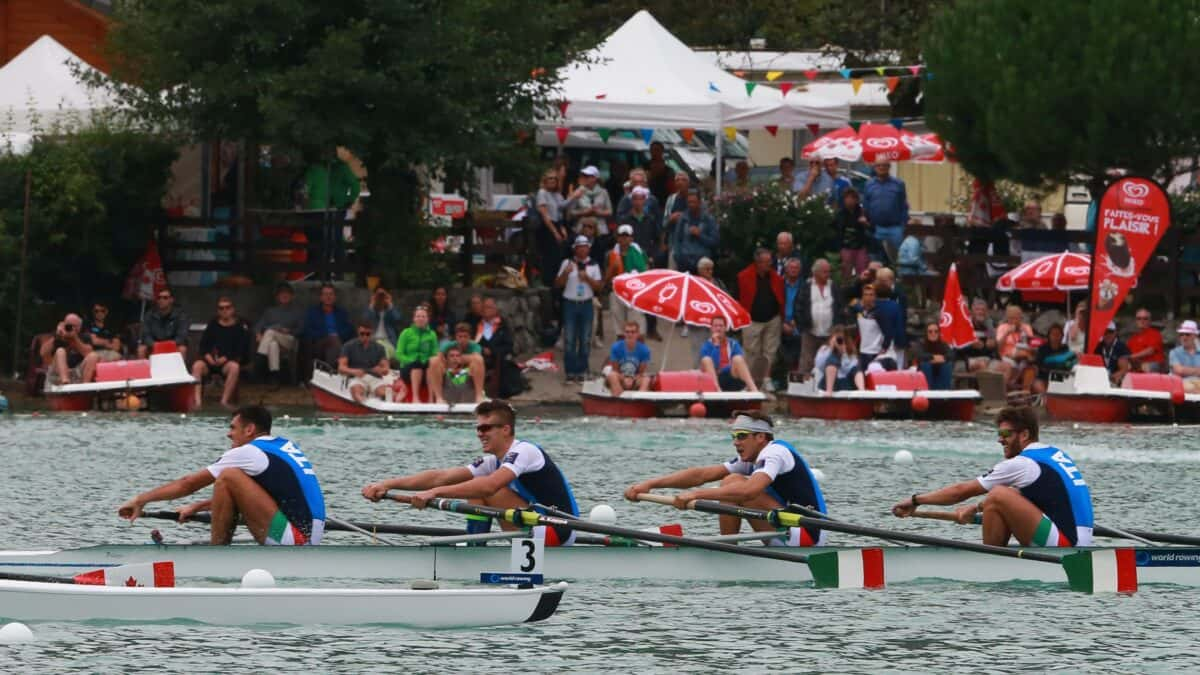
04 Sep 2015
No favourites for men's four
Germany started off the season well to win World Rowing Cup I in Bled (SLO). Then the European Rowing Championships saw the arrival of the British team with their four winning over Greece. The United States came to World Rowing Cup II and won ahead of Italy with Canada in third. In the biggest World Rowing Cup of the season, World Rowing Cup III, Australia beat Italy to the line.
Advancing through these World Rowing Championships, Italy has been recording some of the fastest times. Two-seat Matteo Castaldo says their boat came together in May and he says it felt like they clicked right from the start. “During training we saw that we were fast,” says Castaldo that admits they have training sessions rating 46-47 stroke per minute. “Pepe (stroke man Giuseppe Vicino) is crazy.”
The crew was chosen from the two fastest pairs and they were happy to be put together as they are friends on and off the water. “It’s the first time we’ve all rowed together,” says Castaldo. “Varese (World Rowing Cup II) was our first race ever.”
Castildo says the main focus at this regatta is to qualify their boat for the 2016 Olympic Games and, he says, there’s no doubt that they feel the pressure more than at a regular World Championships. “If we qualify we will stay together for now,” says Castildo, but then next year the best combination will be found.
Australia has come through a rocky season. The 2014 bronze medallists started off the season well and took gold at World Rowing Cup III. Then a team cycling session ended in a crash with Alexander Lloyd being suffering a broken collar bone that ended his season. Towards the end of a five hour ride all four tumbled. “Spencer (Turrin) also had to go to hospital and Alex (Hill) just had gravel rash,” explains bow seat William Lockwood.
Joshua Dunkley-Smith was brought into the boat to replace Lloyd. “I think it was harder for Josh. He had spent a lot of time in the eight,” says Lockwood. “So for him, leaving them was really hard for him. It was more of an adjustment for him than it was for us. Right from the get-go he slotted in really well. He’s a strong rower with a massive erg score, so it was a big injection of horse power.”
Lockwood says the feel of the boat is a bit different from their World Cup race. “We’re trying to hold the speed. We try to even split the middle two 500m now that we’ve got the extra horse power and capacity to do so.
“For the men’s four in Australia there’s a huge legacy that, obviously, the old awesome four left behind,” says Lockwood. ” And we’re trying to create our own legacy, our own way of doing things. We remember the past and we’re trying to create our own future.”
Canada also has a strong legacy in the four. They created a buzz during the semifinals when Tim Schrijver caught a crab close to the finish line. “It was sort of unexpected, so I had to take a moment to think about it before I could pull the crab out. It felt like an eternity because it was pretty nerve wracking. Crothers (bow) was really good about making some calls to get us back together,” says Schrijver.
The Canadian crew is now ready for a “clean” final. “We are very process driven. If we execute the process, the outcome will happen. We focus on the rhythm during the race,” says three-seat Kai Langerfeld who says the winter training has set them up for this race. “We put in a lot of miles during winter training. Our focus was to keep the volume up throughout the season. It set us up for this to be really strong. We had a good taper for this and now we are at the top of our physicality.
“The four is the ultimate rhythm boat. You have four big dudes, who usually don’t have the best touch, and they have to find a rhythm. You don’t have a cox telling you what to do, you have to find it yourselves.”
The men’s four races on Saturday 5 September 2015 at 14:15 CET. It will be live streamed on www.worldrowing.com

